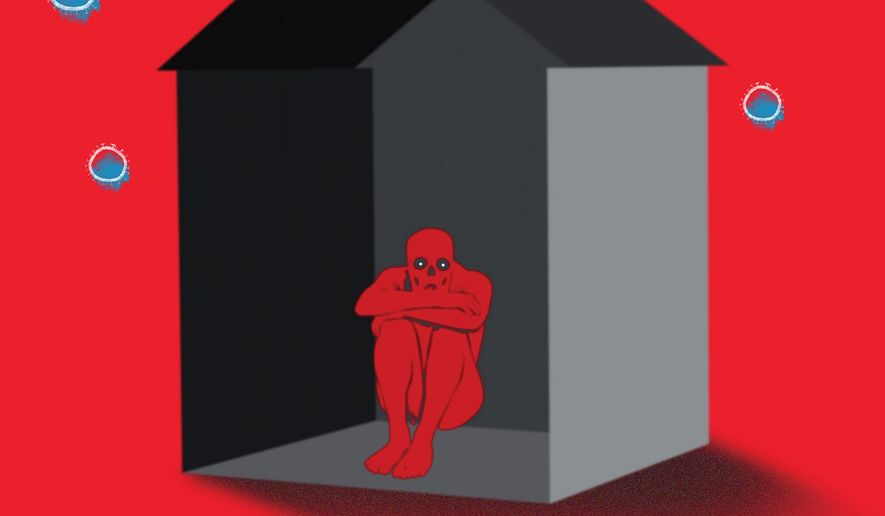OPINION:
One of the many issues that separated the two presidential candidates is how they would handle the coronavirus pandemic from now on. Donald Trump is against a return to lockdown, whereas Joe Biden has left that door open. He has said: “I would shut it down; I would listen to the scientists,”
But details have recently emerged in the U.K. that prove lockdowns are killers, too, and will continue to be for a long time after they are lifted.
The U.K. Office for National Statistics (ONS) has reported that over 25,000 more people died in their homes in the first nine months of this year than in the five year average for that period — and only 9% of those fatalities were due to coronavirus.
This was ascribed to people’s fear of catching the disease if they went to hospital, not wanting to be a burden during a difficult time or, in some cases, being turned away by the hospitals themselves.
A day later, the Daily Mail published its own damning audit of the damage caused in England and Wales by the government’s key lockdown policy to save the National Health Service (NHS) from being overwhelmed. It led to a worsening situation in other areas of healthcare, such as cancer, heart disease, addiction, children’s welfare and mental illness.
A third report by the Dr. Foster group claims that the message to “Stay Home, Protect the NHS, Save Lives” resulted in admissions for non-coronavirus cases falling by up to 90%.
The resulting huge backlog in NHS treatment for cancer is set to cause a 20% rise in patient deaths. And the outcomes in other health areas are also bleak:
• More than 50,000 children’s operations have been cancelled
• Treatments for strokes have plunged by almost 50%
• Accident and emergency visits in England are down by more than half
• Hospital admissions for chemotherapy fell by 66% in April alone
• Cancer diagnosis is down by almost 90% leading to 6,270 extra deaths this year
• Nearly 2,100 extra deaths have been reported in England from heart attacks
• Treatment for strokes fell by 45%
• Organ transplants fell by two thirds, and waiting-list deaths almost doubled
• Delays in bowel cancer diagnosis are likely to lead to 650 and 2,250 extra deaths
• Delays for breast, lung and esophageal cancer patients are likely to cause 2,000 excess deaths
• 18% of U.K. adults reported suicidal thoughts in the first month of lockdown
• Rates of depression across all ages and genders in England roughly doubled
• Almost 40% of patients recovering from drug or alcohol addiction are now likely to suffer a relapse
• Calls to the domestic abuse charity “Refuge” are almost 50% higher
• Calls to child abuse hotlines have also surged
Jeremy Hunt MP, the former health minister and foreign secretary, told the Daily Mail: “Whatever courses of action ministers opt for now, it is simply unconscionable for the NHS to become a Covid-only service. Urgent treatment must continue at all costs.”
However, British MPs have recently voted by 330-24 to extend the government’s emergency coronavirus powers for another six months.
Prime Minister Boris Johnson has placed Greater Manchester under lockdown for the next 28 days and already much of Northern England and London are facing tough restrictions as COVID-19 infections and deaths increase.
Wales has also announced it is to re-enter what its First Minister, Mark Drakeford, called a “time-limited firebreak”, which he described as “a short, sharp, shock to turn back the clock, slow down the virus and buy us more time.”
Mr. Johnson’s current policy is to impose localised restrictions rather than a second nationwide lockdown. He said: “What we are trying to avoid is a national lockdown at all. We don’t rule anything out but the difficulty is that the distribution of the virus this time round is very uneven by comparison with March and April.”
Yet Professor Karol Sikora, a cancer specialist and head of Buckingham Medical School, disagrees: “People sometimes claim it’s a question of health versus the economy, but it’s not — it’s health versus health.”
He supports the Great Barrington Declaration, now signed by more than 10,700 scientists and 29,700 doctors worldwide, calling on governments to adopt an approach of “focused protection” for the most vulnerable while keeping the economy going.
One of its authors, Sunetra Gupta, an epidemiologist at Oxford University, said: “These papers and data are starting to build the evidence to show that the collateral damage has been immense — and will continue with extreme measures such as lockdowns. The time has surely come to take their full costs measures into account.”
At the final presidential debate Joe Biden reiterated his lockdown position by criticizing the decision to reopen schools: “We’re about to go into a dark winter, a dark winter.” Whereas President Trump claimed the U.S. was “rounding the corner” and that the virus was “going away.”
It remains to be seen which is the right prognosis.
• Andrew Davies is a U.K.-based video producer and scriptwriter.




Please read our comment policy before commenting.